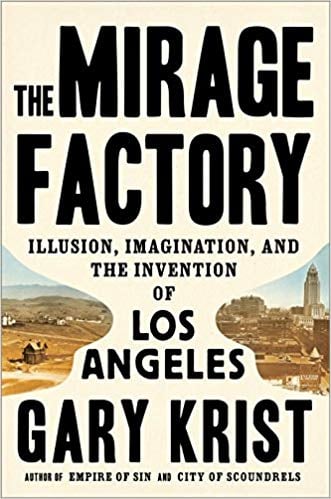You have /5 articles left.
Sign up for a free account or log in.
 The Mirage Factory: Illusion, Imagination, and the Invention of Los Angeles by Gary Krist
The Mirage Factory: Illusion, Imagination, and the Invention of Los Angeles by Gary Krist
Published in May of 2018.
My love for books on cities can be traced to the fact that I live in a small college town. Let’s get one thing clear. There is no better quality of life than small college town life.
If you want to live well, then move to a small town that contains a college. Locate yourself in a walkable local in which the young adults are vastly overrepresented. Find a place where everyone knows everybody, but where new people and ideas are continuously circulated and refreshed.
Those of us who live and work in small college towns know just how good we have it. But we also know that the world is moving to cities. (One of the reasons that we are not).
Urbanization is one of the three most important global trends of the 21st century. The others being the rapid economic development of emerging economies and the aging of everywhere else.
Small town college people love to read books such as Glaeser's Triumph of the City and Martelle’s Detroit: A Biography. (More city biography recommendations please.)
The Mirage Factory is not about today’s Los Angeles, but rather about how L.A. was born. I’ve often wondered how the U.S.’s second largest city (population about 4 million) came to be.
Wasn’t it a bad idea to build a giant city in an area without access to water?
How exactly did Los Angeles become the film capital of the world? (With apologies to Mumbai).
The Mirage Factory goes deep into the stories of William Mulholland (water) and D.W. Griffith (film) to answer both of these questions.
The history of film was a historical blindspot that I didn’t know I had. It seems that we can learn much about the transition of educational technologies from the story of the change from silent to talking films.
The Mirage Factory also turns out to be a great addition to the growing list of books on water and civilization. The history of L.A.’s heroic, scandalous, and destructive quest for water makes an excellent companion to McGraw’s recent A Thirsty Land: The Making of an American Water Crisis.
From reading The Mirage Factory, I now know a fair amount about the origins of Los Angeles. What I don’t know too much about is how L.A. works today.
Can you recommend some recent books on the political economy of the City of Angels?
What are you reading?




